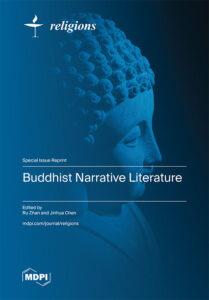
We are pleased to announce the open access release of Buddhist Narrative Literature, edited by Prof. Ru Zhan and Prof. Jinhua Chen, published by MDPI.
Book details:
Ru Zhan, and Jinhua Chen, ed. Buddhist Narrative Literature. MDPI, June 2024. 284 pages. (This book is a reprint of the Special Issue Buddhist Narrative Literature that was published in Religions). ISBN978-3-7258-1337-7 (Hbk); ISBN978-3-7258-1338-4 (PDF). https://doi.org/10.3390/books978-3-7258-1338-4
Download book flyer
About the book:
Any oral and written text can be considered literature in the broadest sense of the word; and Buddhist texts are no exception. The literary quality of Buddhist texts is intimately integrated with Buddhist moral and religious teaching, and it ultimately serves soteriological goals. Buddhist influences in East and South Asian literature are first and foremost observable in the many Buddhist themes, motifs, and personalities that occupy the secular stories, while Buddhist philosophy also became seamlessly integrated with all kinds of literary genres. In terms of narrative style, Buddhism is at its most innovative in its interaction with the general population. Ever since it spread to China, Buddhism had already adopted many popular forms of communications. These popular channels were being adopted by monks who wandered and preached in the countryside, or during feasts and dharma-assemblies, thus greatly facilitating Buddhism’s spread in China. This special issue has as its goal the study of Buddhist narrative literature in the broad context of South and East Asian Buddhist traditions, and seeks to facilitate a thorough discussion on the following non-exhaustive issues: 1. Traditions of Buddhist narrative literature; 2. Narrative Literature and historiography in medieval East Asian society; 3. Comparative study on the narrative literature traditions; 4. Study on specific genres of narrative literature: poetry, (auto-)biography, hagiography, novel, and theatre, etc; 5. Buddhist narrative literature and Buddhist epistemology, historiography, politics, economics, arts, aesthetics, soteriology, or praxis.
About the editors:
Ru Zhan
Ru Zhan is a professor in Peking University’s School of Foreign Languages, and the director
of the Research Center for Buddhist Texts and Art at Peking University. Additionally, he is a vice
president of the Buddhist Association of China and associate director of the Peking University
Orientalism Research Institute. His areas of research include: Buddhist and Buddhist literature, the
Indian Ministry of Buddhism, Dunhuang Buddhism, Buddhist system.
Jinhua Chen
Jinhua Chen is a Fellow of the Royal Society of Canada, and a professor of East Asian intellectual
history (particularly religions) at the University of British Columbia, where he also served as the
Canada Research Chair in East Asian Buddhism (2001–2011). He has extensively published on East
Asian state-church relationships, monastic (hagio-)biographical literature, Buddhist sacred sites, relic
veneration, Buddhism and technological innovation in medieval China, and Buddhist translations
Contents:
About the Editors
Preface
Wenli Fan
Regional, Ideological and Inheritable Characteristics of Knowledge: A Survey of Three
Compilations of Buddhist Encyclopedias in China from 1950s to 2000s
Reprinted from: Religions 2023, 14, 1336, doi:10.3390/rel14111336
Jing Guo
The Buddhist Concept of “Filial Piety” in the Context of Early Chinese Buddhist Scripture
Translation
Reprinted from: Religions 2023,14,1507, doi:10.3390/rel14121507
Chon Iat Lai
Miracle Stories in Motion—On the Three Editions of Guangshiyin Yingyanji
Reprinted from: Religions 2023, 14, 1114, doi:10.3390/rel14091114
Nelson Elliott Landry
Monastics and the Medieval Chinese Buddhist Mythos: A Study of Narrative Elements
in Daoxuan’s Ji shenzhou sanbao gantong lu (Collected Record of Miracles Relating to the
Three Jewels in China)
Reprinted from: Religions 2023, 14, 490, doi:10.3390/rel14040490
Wei Li
From the Imagination to the Reality: Historical Aspects of Rewriting Six Dynasties Buddhist
Avadana Stories
Reprinted from: Religions 2023, 14, 545, doi:10.3390/rel14040545
Ovidiu Matiu
The Dharma Bums: A (Fictional) Pseudo-Buddhist Hagiography, or a Pseudo-ojoden
Reprinted from: Religions 2024, 15, 148, doi:10.3390/rel15020148
Changchun Pei and Wei Li
A Humane Kings Convocation Held in the Zhongxing Palace: A New Study of the P. 3808 Sutra
Sermon
Reprinted from: Religions 2023, 14, 718, doi:10.3390/rel14060718
Junqi Wang
The Formation of Biaoquan and Zhequan as a Pair of Philosophical Concepts in Chinese
Buddhism
Reprinted from: Religions 2023, 14, 516, doi:10.3390/rel14040516
Weilin Wu
On the Patriarchal Lineages of Vinaya Transmission Starting with Upāli: Narratives and
Interpretations in the Vinaya School 律宗 in China and Japan
Reprinted from: Religions 2023, 14, 464, doi:10.3390/rel14040464
Xiaoxiao Xu
“Lamp and Candle”: Classical Chinese Imagery in Taixu’s Poetry
Reprinted from: Religions 2023, 14, 1077, doi:10.3390/rel14081077
Jinchao Zhao
Filial Piety in Fluidity: The Tension between the Textual and Visual Traditions of Śyāma Jātaka
in Early Medieval China
Reprinted from: Religions 2023, 14, 860, doi:10.3390/rel14070860
Wen Zhao
The Story of Sadaprarudita’s Search for Dharma and the Worship of the Prajñāpāramitā Sūtra
from India to Sixth-Century China
Reprinted from: Religions 2023, 14, 410, doi:10.3390/rel14030410
You Zhao
Oneself as Another: Yantraputraka Metaphors in Buddhist Literature
Reprinted from: Religions 2023, 14, 503, doi:10.3390/rel14040503
Liqun Zhou
How Did Bhikṣuṇī Meet Indian Astrology? Viewing the Buddhist Narration and Logic from
the Story of the Mātaṅga Girl
Reprinted from: Religions 2023, 14, 657, doi:10.3390/rel14050657








